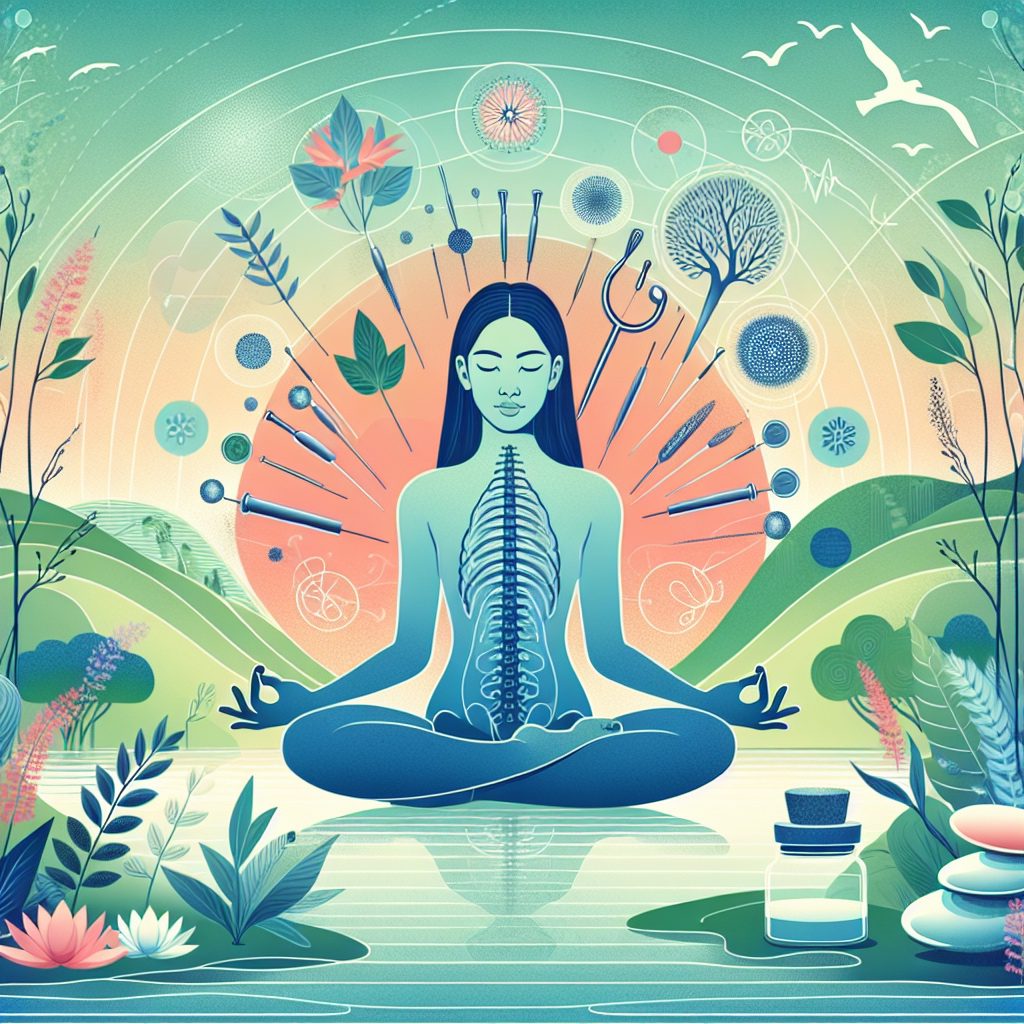In recent years, a fascinating trend has emerged in the world of health and wellness: the integration of ancient Eastern wisdom with modern health practices. This revolutionary approach is breathing new life into our understanding of well-being, combining the time-tested knowledge from spiritual traditions with cutting-edge scientific research. ## The Heart of the Movement: Meditation and Herbal Remedies
At the heart of this movement lies a renewed appreciation for practices like meditation and herbal remedies, which have been used for centuries to promote physical and mental health. As more people seek holistic solutions to their health concerns, the field of integrative medicine has gained significant traction, offering a bridge between traditional and contemporary approaches. This fusion not only addresses physical ailments but also nurtures emotional well-being and fosters adaptive thinking, providing a more comprehensive path to health. The growing interest in this integrative approach reflects a collective desire to embrace the best of both worlds – the wisdom of the past and the innovations of the present – in our quest for optimal health and vitality.
Exploring Specific Integrative Practices
As we delve deeper into this fascinating fusion of ancient wisdom and modern science, it’s crucial to explore specific practices that exemplify this integration. One such practice is cognitive restructuring, a technique that combines elements of Eastern mindfulness with Western cognitive behavioral therapy. This approach helps individuals reframe negative thought patterns, fostering resilience and emotional well-being. By incorporating mindfulness techniques rooted in ancient Buddhist traditions, cognitive restructuring becomes a powerful tool for managing stress and anxiety in our fast-paced modern world.
Acupuncture: Bridging East and West
Another prime example of this East-West integration is acupuncture, an ancient Chinese healing technique that has gained significant recognition in Western medicine. Modern research has validated the effectiveness of acupuncture in treating various conditions, from chronic pain to nausea and migraines. As more healthcare providers incorporate acupuncture into their treatment plans, we’re witnessing a beautiful synergy between traditional wisdom and contemporary medical practices.
The Renaissance of Herbal Supplements
Herbal supplements, long revered in Eastern medicine, are also experiencing a renaissance in the West. As scientific studies continue to uncover the potential benefits of natural compounds, the use of herbal remedies is becoming increasingly mainstream. For instance, adaptogens like ashwagandha and rhodiola, traditionally used in Ayurvedic and Chinese medicine, are now being embraced for their stress-reducing and energy-boosting properties. This growing acceptance of herbal supplements in modern health practices reflects a broader shift towards natural, holistic approaches to wellness.
The effectiveness of these integrative approaches is not just theoretical; real people are experiencing tangible benefits. Take Sarah, a 35-year-old marketing executive who struggled with chronic stress and insomnia. After trying various conventional treatments with limited success, she turned to an integrative approach that combined cognitive restructuring techniques, acupuncture, and herbal supplements. Within months, Sarah reported significant improvements in her sleep quality and overall stress levels, allowing her to thrive both personally and professionally.
Community Health Initiatives
Similarly, integrative medicine has shown promising results in community health initiatives. In San Francisco, a community clinic that offers a blend of Western medicine and Traditional Chinese Medicine (TCM) has seen remarkable outcomes in managing chronic conditions like diabetes and hypertension. By combining conventional treatments with acupuncture, herbal remedies, and lifestyle modifications based on TCM principles, the clinic has helped numerous patients achieve better health outcomes and improved quality of life.
These success stories highlight the potential of integrative medicine to address complex health issues that may not respond fully to conventional treatments alone. By embracing a more holistic approach that considers the interconnectedness of body, mind, and spirit, integrative medicine offers a more comprehensive path to healing and well-being.
As we continue to explore the intersection of ancient wisdom and modern science, it’s clear that this integrative approach is more than just a passing trend. It represents a fundamental shift in how we think about health and wellness, acknowledging the profound insights that ancient traditions can offer to our modern understanding of human health. This fusion not only expands our toolkit for addressing health concerns but also encourages a more mindful and balanced approach to living.
Medicine as a Spiritual Path
Reflecting on the broader implications of this integrative approach, we can see that viewing medicine as a spiritual path characterized by compassion, harmlessness, service, and reverence for life offers a profound shift in our healthcare paradigm. This perspective, deeply rooted in ancient Eastern wisdom, provides a holistic framework that goes beyond treating symptoms to nurturing the whole person.
Ancient wisdom offers invaluable insights into human nature, resilience, and dealing with adversity. These time-honored teachings remind us that health is not merely the absence of disease, but a state of balance and harmony within ourselves and with our environment. By incorporating these principles into modern healthcare, we can foster a more compassionate and patient-centered approach to healing.
The Role of Mindfulness
For instance, the concept of mindfulness, derived from Buddhist traditions, has been shown to enhance emotional regulation, reduce stress, and improve overall well-being. When healthcare practitioners approach their work with mindfulness and compassion, it not only benefits the patients but also helps prevent burnout among healthcare professionals. This aligns perfectly with the idea of medicine as a spiritual path, where the act of healing becomes a form of service and a means of personal growth for both the healer and the patient.
Moreover, ancient wisdom emphasizes the importance of prevention and maintaining balance in life. This aligns with the growing focus on preventive care in modern medicine. By adopting practices like regular meditation, balanced nutrition, and mindful movement, individuals can take a proactive approach to their health, potentially reducing the need for interventions later in life.
Renewed Focus on the Mind-Body Connection
The integration of ancient wisdom also brings a renewed focus on the mind-body connection. Eastern philosophies have long recognized the intricate relationship between mental and physical health, a concept that modern science is now validating through fields like psychoneuroimmunology. This understanding opens up new avenues for treating complex conditions that may have both physical and psychological components.
Conclusion: A Powerful Evolution in Wellness
In conclusion, the fusion of ancient Eastern wisdom with modern health practices represents a powerful evolution in our approach to wellness. By embracing the best of both worlds, we can create a more comprehensive, compassionate, and effective healthcare system. This integrative approach aligns perfectly with HerbalsZen’s philosophy of providing premium natural ingredients to enhance overall vitality.
As we move forward, it’s crucial to continue exploring and validating these integrative approaches through rigorous scientific research. At the same time, we must remain open to the profound insights offered by ancient wisdom traditions. By balancing body and mind through natural ways, we can tap into our innate healing potential and achieve a state of true wellness.
The journey towards integrating ancient wisdom into modern health practices is ongoing, and it holds immense promise for the future of healthcare. As more people embrace this holistic approach, we may see a shift towards a more balanced, preventive, and compassionate model of health and healing. This evolution in healthcare not only has the potential to improve individual well-being but also to create a healthier, more harmonious society as a whole.




